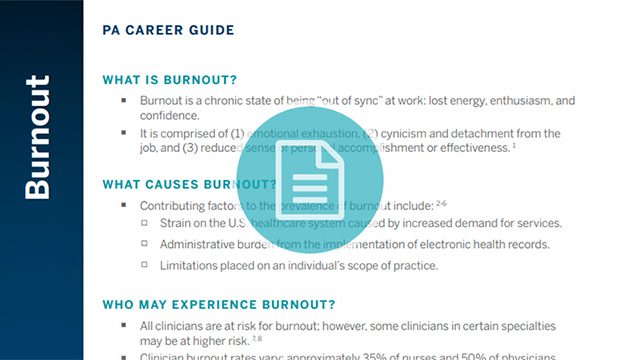Career Resources
Approach to limiting bias for patients with Mental Health and Substance Use Disorders
Stigma and bias can lead to poor patient outcomes for people who have mental health and substance use disorders. So, what can providers do to help patients and limit their barriers to receiving good care? Find out how you can help mitigate bias and stigma in the healthcare setting.
Putting Bias Aside
It is essential that providers can connect with patients, recognize signs of mental health and substance use disorders, and holistically approach the treatment of these patients. In this article, you will learn how bias and stigma affect health outcomes for patients with mental illness and substance use disorders, and identify some of the different types of bias and stigma that may affect the care that healthcare providers give to their patients.
Keys to a Thriving PA-Physician Team
The happiest PAs feel like they are part of a vital, mutually supportive team. Read on to learn the most common roots of dissatisfying team relationships and learn the PA Career Coach’s tips for cultivating and maintaining a strong relationship with the physicians on your team.
Taking A Sabbatical
PAs report high job satisfaction but also suffer from burnout, which can take extended periods to fully recover from. Taking a sabbatical from the profession has many benefits and can help foster burnout recovery.
Building Collegial Connections
Relationships are the cornerstone of PA practice. PAs can promote positive connections with colleagues through trust, respect, communication, and clarity.
Continuing Medical Education (CME) Optimization
Make the most of your CME budget and learn how to tailor your clinical education to your individual learning style and needs.
Effective Patient Communication: Background, Benefits + Best Practices
This article is an overview of effective patient communication, from background to benefits to strategies and pitfalls that the clinician should know.
Burnout Can Occur Early Among PAs and PA Students
Although one might think that burnout only occurs in seasoned PA providers, even students can experience burnout. There is hope for the student and early career PA. A national trend toward addressing the mental health of our medical providers includes new assessments and onboarding.

Here’s How Every PA Can Play a Role in Mental Healthcare
Megan Pinder, MMS, PA-C, is an advocate for psychiatric patients both personally and professionally. She responds to questions about PAs’ role in mental health, how access, socioeconomic status, and stigma impact patient mental health, and how to advocate for mental health patients.

Health Inequities: How PAs Can Help Bridge the Care Gap
The PA Foundation’s Vital Minds podcast featured a discussion on how health disparities have been exacerbated by COVID-19, the role socioeconomic factors and insurance may play in health disparities, and how PAs – and other allies – can help bridge the care gap.

Expert Advice on Providing Trans-Affirming Healthcare
AAPA invited PAs Lauren Eisenbeis and Jo Rolls to host Huddle’s latest Ask Me session on transgender healthcare. Eisenbeis and Rolls used their expertise from years of experience to provide advice and resources for PAs to provide trans-affirming healthcare to patients.
PA Wellness
At AAPA, we’re here to support your PA well-being and fight PA burnout by ensuring your emotional, physical, social, workplace, and societal well-being.

How PAs Can Provide Compassionate Care to Survivors of Interpersonal Violence
AAPA enlisted Katherine Thompson, PA-C, a practicing PA in emergency medicine and urgent care for four years, to respond to Huddle’s Ask Me on interpersonal violence (IPV) and forensic medicine. Read her advice on how healthcare providers can identify and manage IPV survivors.

Blueprint for Addressing Physician Assistant Well-being and Burnout
The goal of the Blueprint for Addressing PA Well-Being and Burnout is to provide a brief overview of what is currently known about PA burnout and well-being, and more importantly, provide an enduring framework for increasing PA engagement at work and improving the well-being of the profession.

Feeling Unfulfilled? You Might Need a New Job
Changing jobs is one of the most impactful ways of creating positive change in your PA career. Is it time for you to move on from a position that is no longer inspiring, sustainable, or financially rewarding?

